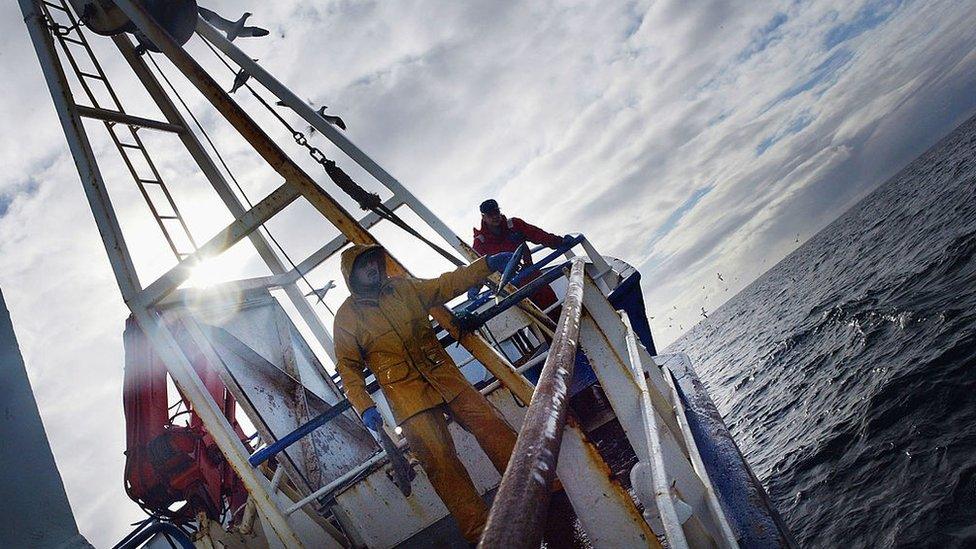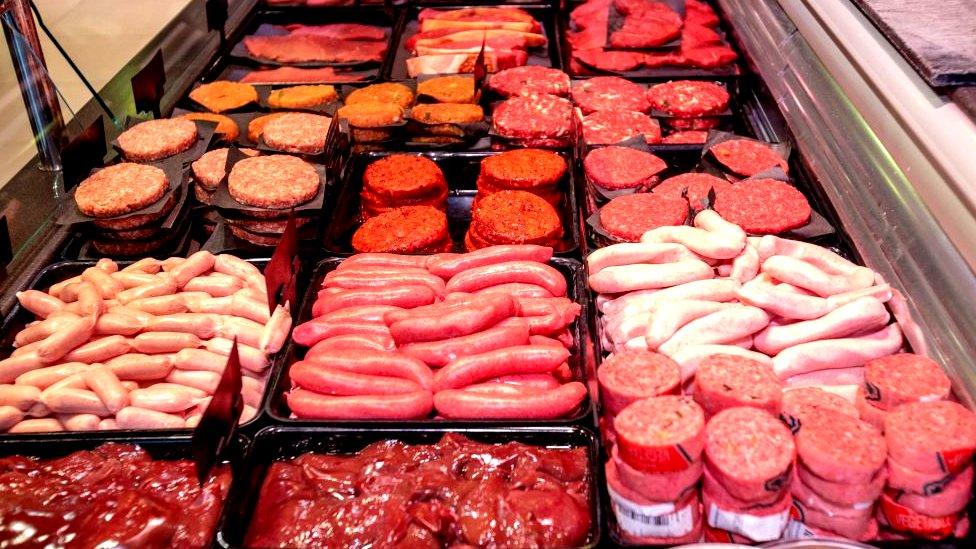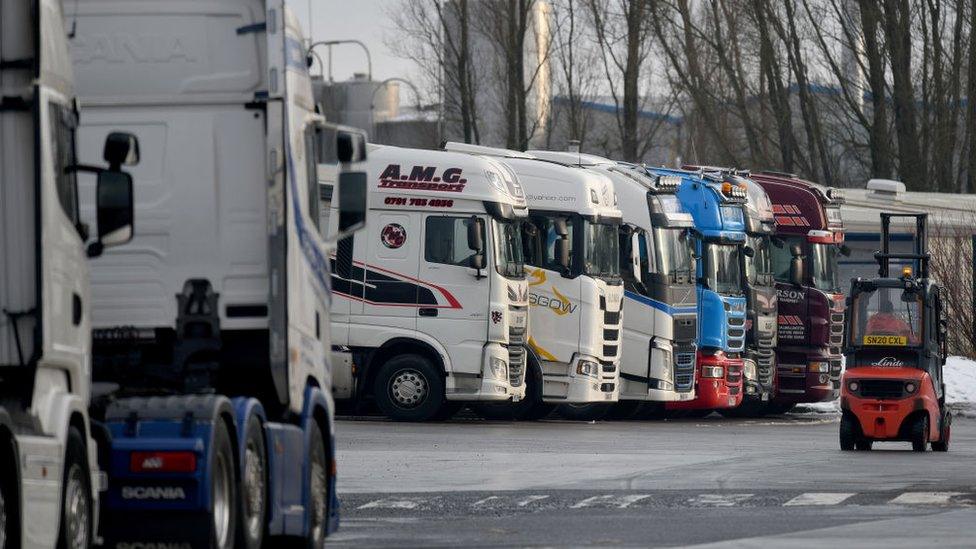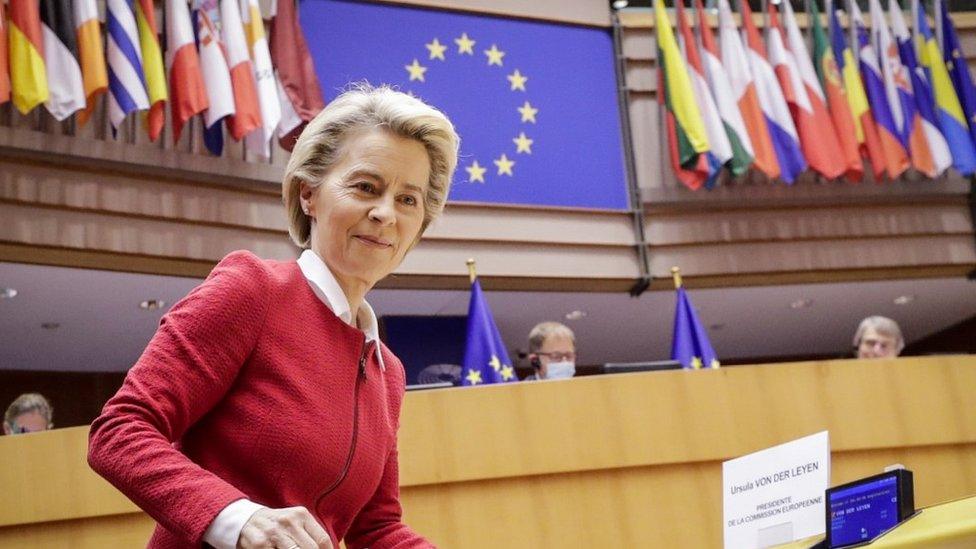Pressure mounts to reopen Brexit deal
- Published

Small firms, like shellfish exporters, are considerably worse off than larger ones
Meat and seafood, particularly exports by small firms, are paying the highest price for the Brexit deal, and pressure is growing to lighten the burden of paperwork.
German businesses that are used to UK supply are now paying higher costs and looking elsewhere for more reliable partners.
Australia is set to be the next UK trade deal: future food standards are being negotiated behind closed doors.
Four months into Britain's break from the European customs union with its single market, and on 1 May, it becomes fully legal.
The European Parliament has endorsed the deal. And today, the Council as well.
Portugal's minister for Europe, in the chair, says this opens a new chapter: "We value the UK as a good neighbour, an old ally and an important partner".
Who says they don't have a sense of humour in Brussels?
Meanwhile, where the UK meets the EU, both seafood and meat remain on the menu as those paying the highest price.
MPs at Westminster are today highlighting the problems for the food sector, and warning that firms will collapse and jobs go overseas if there isn't action taken to amend the deal struck on Christmas Eve.
Scotland Food and Drink, representing much of the sector north of the border, has seized on the proposal that a deal should be negotiated on mutual recognition of food standards and vet inspections.
They're facing "no gain and a world of pain", according to its chief executive, James Withers.
But as the MPs point out, there's not a level playing field on food trade. The UK government has delayed implementation of inspections of EU food entering Britain - apparently wishing to avoid food shortages leaving British shop shelves bare.
So what leverage is there to get the European Commission to change the way things now are?
Meat delayed
The environment, food and agricultural committee goes on to propose more compensation for firms affected by the disruption to trade.

Small firms who export shellfish to Europe are finding the red tape a challenge
They say there should be hubs created to help smaller companies with consignments that get loaded into "groupage" - those truckloads that carry pallets with several companies' exports, each requiring different certification and moving through customs at the speed of the least compliant.
For that reason, smaller firms are considerably worse affected by the changes to trade than larger ones.
This doesn't affect meat as much as seafood, where exporters tend to be smaller firms.
But speaking to the trade commission of MPs on Thursday morning, the boss of Britain's meat processor organisation estimated that a 24-hour turnaround for exports has had at least a day added "with a fair wind", around £1,000 of cost per truckload, plus an army of people handling the extra paperwork.
Nick Allen reckons that meat exports are running at 70 to 75% of their previous levels, because the deal imposes a trading system designed for large containers on ships rather than rapid transit of trucks.
Karin Goodburn, representing the chilled food sector, points out that the export health certificate lacks the space to list all the ingredients you can have in a chilled meal. Due to the complexity, a truck driver can have to present 50 different pieces of paperwork. Changes since 1 January have been "significant, expensive and extremely time-consuming".
Supply from elsewhere
More evidence of the disruption to trade came from Germany this week. A sample of 93 companies that were active in UK-Germany trade before the end of last year found most face higher costs, and Germans are often looking elsewhere for more reliable suppliers.
Carried out by the British Chamber of Commerce in Germany with KPMG with most of them based on the continent, it found that one in six companies had decided to cease exports to the UK altogether.
More than a fifth have been replacing UK suppliers with those in other countries, and only around 30% intend to look for new sales markets and product opportunities inside the British-German "corridor".
Most have found freight is harder to secure and more expensive, and they foresee significant difficulties with secondments when Covid restrictions lift and staff are allowed to move across borders again.

Meat exporters are running at 70-755 of their previous levels
This could help build pressure on the UK and EU administrations to make at least some amendments to the deal they struck. The MPs' report makes it clear that a five-year review is too far off.
A large group of cultural figures have added to the pressure this week, with demands to ease up on working permits for those working on either side of the divide.
Australian windfall
There seems little appetite in Downing Street for opening up talks again, at least with the European Commission.
They look to upsides from Brexit, coming from beyond Europe. Liz Truss, the trade secretary has been seeing to the opening up of 'global Britain', using the UK's new-found freedom to strike trade deals elsewhere.
Last autumn, Japan agreed a deal that, among other things, allowed more British cheese into the Japanese market, but only if the EU quotas were not fully used up.
The next deal looks like being with Australia. Last week, Ms Truss and her Canberra counterpart, Dan Trehan, held two days of talks, concluding that they should finalise outstanding issues for sign-off in June.
And what were those issues? They weren't saying, but Australian broadcaster ABC was reporting that it offered "Boris Johnson a political, if not economic windfall".
It cited the UK government's analysis forecasting a boost in British economic output of a fifth of one per cent while: "It's expected the upside for Australia would be considerably greater, with Australian beef and lamb producers hoping for significantly increased access to the UK market.
"But British farmers have been lobbying Westminster to demand all Australian meat imports meet the high environmental and animal welfare standards imposed on local products.
"The National Farmers Union has told the UK government that Australian farmers can take advantage of hormones and veterinary medicines that are banned in Britain.
"Similar concerns have also been raised by the National Sheep Association".

Freight is harder to secure and now costs more
Mr Trehan was quoted saying that he hopes this doesn't become a row about which side has the better food standards.
Trade experts suggest a deal is likely to allow for tariff-free quotas.
This lack of clarity is significant for future deals, if so little is known to the public and to business about the trade discussions. Deals will be signed off, with the only further obstacle being a vote by the House of Commons.
Meanwhile, with the Biden administration open to trade deals, this week's recent bilateral virtual meeting between Ms Truss and the US Trade Representative appeared to include no talk at all about a broad trade deal, but about more pressing issues around vaccines and the long-running airliner dispute.
Promise broken
It's striking that such a big change in Britain's economy isn't playing a bigger part in the election campaigns across the UK.
It's possible, if not probable, that voters are fed up talking about Brexit. But reports from the council battlefields of south-west England include fishing communities which feel they were misled about the benefits of Brexit.
European boats are still allowed to fish close to the Cornish coastline, and seafood export businesses face a similar set of problems to those in Scotland.
In Northern Ireland, there are a number of reasons why Arlene Foster was deposed by the Democratic Unionists, but the trade border in the Irish Sea - which she was promised by the Prime Minister would not happen - has been a big part of the dissatisfaction.
It seems a little unlikely that the process of selecting her replacement will reduce the tensions.
The economic and perhaps the political fallout from Brexit has only just begun.
Related topics
- Published28 April 2021

- Published15 January 2021
